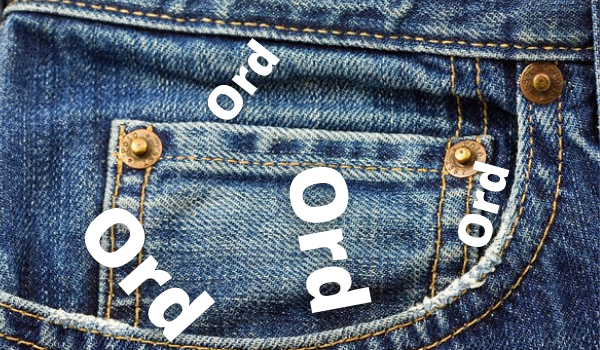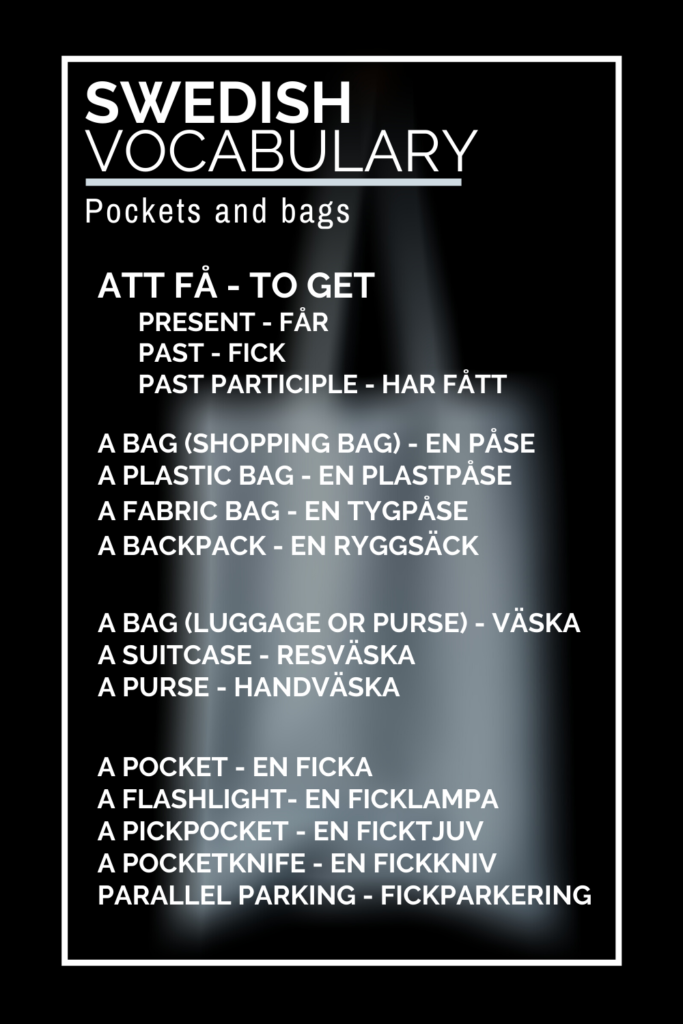Swedish Words to Keep in Your Pocket

Today I have another word history post for you guys! I’ve been saving interesting etymology as I come across it, and I recently stumbled across a web of intertwined meanings between words for pockets, pouches, bags, and purses. I’d like to take a look at some practical scenarios involving bags and pockets, then dive into the history.
To start out, here’s a practical phrase you’ll need to know when moving to Sweden. When I first started to venture out to stores on my own with my very limited Swedish I became weirdly nervous every time I wanted to buy something. I wanted to practice my Swedish, but the cashiers speak so quickly it’s difficult not to freeze up and switch back to English. Here’s a heads up on what to expect when going to pay:
Back in the US you almost always hear “receipt with you or in the bag?” Not so here in Sweden. It’s not taken for granted that you’ll automatically get a bag for free (we have to be eco friendly and save the plastic after all), so you’ll likely hear “behöver du köpa en påse?” (do you need to buy a bag?). You’ll also hear “Var det bra så?” This is one of those weird Swedish phrases where the literal phrasing cannot be directly translated to English. The word for word translation is something like “was it good then?”, but basically means “Is that all?/Will there be anything else?”
Also, cashiers have a tendency to speak very quickly so it will sound more like “vabraså?” Now you have an idea of what to expect when checking out, hopefully you can be less flustered than I was when running into these phrases at first! I will add these two to another 10 basic Swedish phrases list coming up shortly.

Words for Bag in Swedish
So now you’ve successfully purchased your “påse” from the store, but if you really want to fit in with Swedish culture, make sure to bring your own reusable bag next time! If it’s made of fabric, this is your “tygpåse” (fabric bag), as opposed to the store’s “plastpåse” (plastic bag). Whatever the material, “påse” will almost always refer to a small, non-closable bag without any type of rigid structure. So what if you have a backpack with you? Instead of “påse”, this is your “ryggsäck” (back sack). “Säck” on it’s own doesn’t seem to be as common as some other words for bag, but carries the same meaning as “sack” in English, just meaning a large bag.
What if you brought a suitcase with you? Now we’re getting into a class of bag words called “väska” which still translates to English as bag, but tend to have more structure, ability to close/lock, and a specific purpose. Suitcase here would be “resväska” (travel bag). A purse would be “handväska” (hand bag).
Language History – Old Norse, Swedish, English, and French
So if we have “påse”, “väska”, and “säck”, is there any connection to “bag” in English? I can find some evidence of “baggi” in Old Norse (and modern Icelandic), which means a bundle or package. As words are borrowed and passed between countries and speakers, the sounds have a tendency to shift in predictable ways. B, P, and F have a habit of becoming switched for each other, so it’s possible “baggi” became something like “paggi” or “pakki” and could form the basis for “paket” (package) in Swedish. This is a good time for my disclaimer: I’m not a language expert, just a guy with Google, a ton of time to kill, and a fascination with word nerdery.
Old Norse had two other words for a bag or pouch – “poki”, and a small bag was “posi”. “Posi” is likely where the Swedish “påse” comes from, while is seems that “poki” was transferred into English as “pocca”, and later “poke”. If you’ve ever heard the old-timey phrase “a pig in a poke”, a bag was what they were talking about.
This transferred into French as “poque”, (“pouch” worked its way in there somewhere as well) eventually took the diminutive ending to become “poquette”, which found its way back to English as “pocket”. A little bag that then eventually began to be sewn into pants.
Back to Swedish
So we have all these words for different kinds of bags, pockets, pouches, and so on, what’s the deal with pocket in Swedish? The word for pocket is “ficka”, and it’s an interesting story.
If you’ve been studying Swedish for a while, you might recognize “fick” as the past tense of “att få” (to get). You can almost think of “ficka” as the place to put things you get.
To trace this back through its older versions, Old Norse had “Fá” (to get), and another form of the same word “Fanga” (to capture or seize). Swedish today has this word as “att fånga” (to catch or capture). English actually has a word descended from an ancestor of these – fang. It’s not hard to see the relations between all these words and catching, capturing, seizing, and getting (receiving) something. But once you’ve done that, you need a place to put the goods, and that’s in your “ficka”.
Pocket Vocabulary
I learned some new constructions while doing research for this that made me chuckle. I love how literal Swedish is in creating words, so here are a few of them.
“Ficklampa” (pocket lamp) is a flashlight. Makes perfect sense! Instead of a pickpocket, you have a “ficktjuv” (pocket thief). Pocket knife is an exact double of its English translation as “fickkniv”, and I’ve saved the best for last. When you’re parallel parking, you may only have a little pocket of space to fit the car into between other cars, thus you are actually “fickparkering” (pocket parking).
I hope this helps you continue to add Swedish words to your vocabulary! As always, here is a vocab list with most of the words I’ve gone over in this article.
Bonus Swedish Vocabulary

